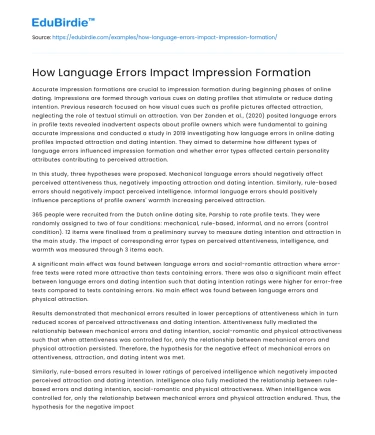Accurate impression formations are crucial to impression formation during beginning phases of online dating. Impressions are formed through various cues on dating profiles that stimulate or reduce dating intention. Previous research focused on how visual cues such as profile pictures affected attraction, neglecting the role of textual stimuli on attraction. Van Der Zanden et al., (2020) posited language errors in profile texts revealed inadvertent aspects about profile owners which were fundamental to gaining accurate impressions and conducted a study in 2019 investigating how language errors in online dating profiles impacted attraction and dating intention. They aimed to determine how different types of language errors influenced impression formation and whether error types affected certain personality attributes contributing to perceived attraction.
In this study, three hypotheses were proposed. Mechanical language errors should negatively affect perceived attentiveness thus, negatively impacting attraction and dating intention. Similarly, rule-based errors should negatively impact perceived intelligence. Informal language errors should positively influence perceptions of profile owners' warmth increasing perceived attraction.
Save your time!
We can take care of your essay
- Proper editing and formatting
- Free revision, title page, and bibliography
- Flexible prices and money-back guarantee
365 people were recruited from the Dutch online dating site, Parship to rate profile texts. They were randomly assigned to two of four conditions: mechanical, rule-based, informal, and no errors (control condition). 12 items were finalised from a preliminary survey to measure dating intention and attraction in the main study. The impact of corresponding error types on perceived attentiveness, intelligence, and warmth was measured through 3 items each.
A significant main effect was found between language errors and social-romantic attraction where error-free texts were rated more attractive than texts containing errors. There was also a significant main effect between language errors and dating intention such that dating intention ratings were higher for error-free texts compared to texts containing errors. No main effect was found between language errors and physical attraction.
Results demonstrated that mechanical errors resulted in lower perceptions of attentiveness which in turn reduced scores of perceived attractiveness and dating intention. Attentiveness fully mediated the relationship between mechanical errors and dating intention, social-romantic and physical attractiveness such that when attentiveness was controlled for, only the relationship between mechanical errors and physical attraction persisted. Therefore, the hypothesis for the negative effect of mechanical errors on attentiveness, attraction, and dating intent was met.
Similarly, rule-based errors resulted in lower ratings of perceived intelligence which negatively impacted perceived attraction and dating intention. Intelligence also fully mediated the relationship between rule-based errors and dating intention, social-romantic and physical attractiveness. When intelligence was controlled for, only the relationship between mechanical errors and physical attraction endured. Thus, the hypothesis for the negative impact of rule-based errors on perceived intelligence, attraction, and dating intention was also met.
Contrary to expectations, no significant relationship between informal errors and perceived warmth was found. Warmth did not mediate the relationship between informal errors and physical attraction or dating intention but partially did for social-romantic attraction in a negative direction. Those with informal errors appeared less warm compared to error-free texts resulting in lower attractiveness ratings. The effect size was also small indicating informal errors had minimal effect on perceived attraction. Therefore, the final hypothesis for the positive effect of informal errors on perceived warmth, attraction, and dating intention was not met.
This study made an important empirical contribution to our understanding of how language errors contribute towards perceived attraction and dating intention in online dating. Language errors were significantly associated with social-romantic attraction and dating intent also proving useful in revealing profile owners' personality attributes such as attentiveness and intelligence which contributed significantly to perceived attraction. For the unexpected findings, a deliberate decision to use informal errors may have been made to increase perceptions of warmth however, such errors were perceived similarly to unintentional errors explaining the lack of association.
Nevertheless, this study had several limitations. All effect sizes were small to medium highlighting that on dating profiles, language errors form only one of several cues contributing to impression formation. Furthermore, only 39.5% of participants noticed language errors in the text raising the issue of whether individuals are inclined to detect language errors. Another limitation not mentioned in the study concerned the sample which was restricted to native-Dutch speakers limiting the generalisability of the findings. Future research should examine whether this effect can be reproduced in other cultures' online dating communities to strengthen its validity. This study also only focused on social-romantic and physical attraction. It is still not known what other dimensions of attraction language errors may affect. Future research should investigate whether language errors impact other attraction dimensions such as interpersonal or sexual attraction. Furthermore, the present study only examined how error types affected perceptions of readers so future research could examine whether readers' attributes could determine which cues are activated for impression formation.
This study revealed how language errors impacted different dimensions of perceived attractiveness and dating intention. Through this study, I learned that textual stimuli were paramount in accurately perceiving social-romantic attractiveness and that textual cues can contribute to various perceptions of profile owners' personality attributes depending on the error type. This study formed a strong basis for future research on how textual stimuli cues may impact attraction.






 Stuck on your essay?
Stuck on your essay?

